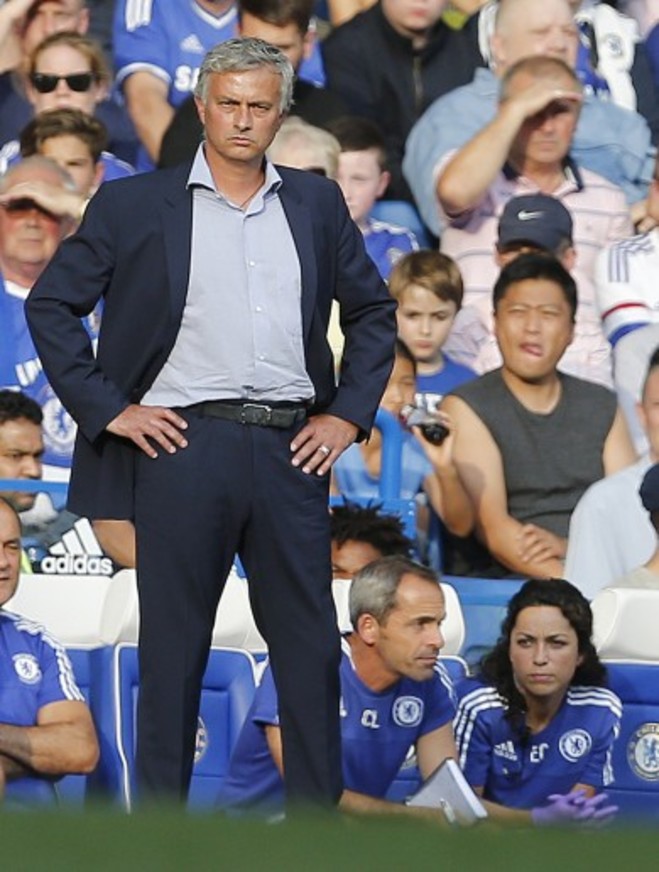1. His appalling treatment of Eva Carneiro and Jon Fearn
JOSE MOURINHO DID not start this season with the aura of a confident man who had just overseen his side comfortably secure the Premier League title.
Instead, the old insecurities and undignified behaviour that have become Mourinho’s hallmarks over the years were apparent once again.
Before the season had started, Mourinho was already mocking Rafa Benitez’s weight. After the team’s first game, he had severely punished club doctors Eva Carneiro and Jon Fearn for essentially doing their job.
He was as unreasonable as ever in post-match interviews — blaming the media, the officials, anyone other than himself essentially — after the nine league matches the team lost, in what was their worst start to a season since 1978, when they were eventually relegated.
The treatment of Carneiro, in particular, is understood to have hit a nerve, with several players’ wives believed to be especially unhappy with how this popular figure in the dressing room was dealt with.
Granted, footballers invariably insist that what goes on off the field has no impact on their performances on it, but as far as this Chelsea side was concerned, actions spoke louder than words.
2. He had genuinely lost (most of) the dressing room
Perhaps sensing the inevitable end was near, Mourinho heavily criticised his players in the wake of their 2-1 loss to Leicester on Monday.
“Some of them need to rethink the way they live Chelsea, they live football, they live their job,” he told Chelsea TV.
The word “some” is key here, and perhaps reflects the fact that a minority of players in the Chelsea dressing room are believed to have been behind Mourinho right up until his sacking.
Speaking to reporters, he added: “They have to look at the Leicester boys and feel these are the stars, these are the top players. They have to look to Sunderland and Watford [Chelsea’s next two opponents] and say: ‘We are at the same level, I am not the superstar, I am not the player of the season. I am not the world champion, I am not the Premier League champion. At this moment, I am at your level.’”
The fact that he was effectively singling out “world champion” Cesc Fabregas and “player of the season” Eden Hazard was telling.
It is a stark contrast with Mourinho’s previous stint in charge of Chelsea, when players such as Frank Lampard, John Terry and even less expressive individuals like Damien Duff could routinely be seen embracing Mourinho after games and patently enjoying a close bond with their manager, even if that period also ended in unhappy circumstances.
Perhaps, as ESPN have suggested, it is a sign of footballers’ evolution in temperament — whereas tough, aggressive figures such as Arjen Robben, Didier Drogba and Frank Lampard were willing to accept criticism, younger players (i.e. those of a different generation) including Fabregas and Hazard are more sensitive and thus less receptive to Mourinho’s abrasive style.
3. The third-season syndrome strikes again
Yesterday’s news has continued a worrying trend for Jose Mourinho — the Special One has never lasted more than three seasons at a club.
Times columnist Matthew Syed has suggested Mourinho is too “immature” to create a dynasty in the manner that other top managers such as Alex Ferguson and Arsene Wenger have managed.
Syed suggests that players gradually tire of his problematic behaviour — the ‘us against them’ mentality he creates and the countless conspiracies he conjures are effective up to a point but ultimately seem like feeble excuses for deeper issues.
As was the case with all his other clubs, Chelsea earned short-term success under Mourinho, winning the Premier League and League Cup last season, before their ignominious collapse mere months later.
The trend is perhaps down to a growing sense of disillusionment with the Special One’s style of play. While Mourinho was happy to embrace a positive attacking philosophy for a period during his Chelsea tenure, after a few bad results, he returned to what he knows best — containing the opposition.
The 5-3 loss to Tottenham at White Hart Lane almost exactly a year ago appears to have been somewhat of a watershed moment. Thereafter, Chelsea played with a conspicuously cautious and conservative style on a consistent basis, which was even evident at home against a 10-man PSG in last season’s Champions League quarter-final — the one considerable black mark on an otherwise successful campaign.
Of course, by last January, Chelsea had solidified their place at the top of the Premier League, and morale was sufficiently high that even their restrictive, defensive approach was enough to earn Mourinho his third Premier League title win, despite the trend in European football favouring an attacking style that even conceivably weaker English clubs such as Leicester and Bournemouth have embraced up to a point.
However, this season, Mourinho’s formula has proved continually ineffectual. Technically gifted players such as Fabregas, Hazard and Costa have subsequently looked increasingly uninspired amid this debilitating brand of anti-football.
4. THAT post-match interview
It’s an unspoken rule in football that a manager should avoid criticising his players publicly at all costs — Alex Ferguson, the template for long-term managerial success, was a master of this art, predominantly unleashing his ire on referees and their performances instead.
Mourinho usually adheres to this philosophy too, and instead blames everyone else — officials, pundits and even ballboys. Yet on Monday night, the soon-to-be-ex-Chelsea boss said he felt “betrayed” by his players.
Of course, no manager loses his job on the basis of one post-match interview, but his angry words to the Sky cameras had huge symbolic signficance — it was the footballing equivalent of breaking the fourth wall.
It was also the biggest sign yet that Mourinho, having tried and failed to understand the troubling issues at the core of the London club, had simply given up.
As ever, however, rather than representing an emotional outburst in the heat of the moment, the fact that he used the word “betrayal” in all three of his post-match interviews indicates it was a deeply calculated move.
The Times reports that Mourinho’s anger was caused, not just by the team’s inept performance against Leicester, but by his suspicion that a player leaked the Blues’ teamsheet prior to their crucial Champions League group match with Porto, which they ultimately won 2-0.
It would no surprise if that is indeed the case, as paranoia over leaked information and player betrayals was also a recurring team in the Portuguese coach’s similarly fractious final season in charge at Real Madrid.
5. His narcissistic personality
Perhaps more than any other manager in football, Mourinho tends to emphasise his own successes — ‘I am a champion,’ ‘I have won Champions Leagues,’ etc.
Even in a defiant final interview before the announcement of his departure, Mourinho appeared keen to trumpet his own achievements and blame more or less everyone but himself for Chelsea’s decline.
“I have to say it’s a good experience,” he said, of the Blues’ sudden poor run of form, in an interview broadcast on BT Sport. “An experience that probably came too late, (it has) come after 15 years.
“I was ready to live with it, to cope with it because (of my) maturity and experience… but I can imagine that if this happened in the beginning probably my career would have been even better.
“This is an amazing learning process. About myself. About the players, I think I know everything. About myself, I still have some things to discover. And this period was important for me. I’m better than I thought.”
Mourinho may have achieved several impressive managerial feats, but his unashamedly self-serving nature and tendency to alienate so many may cause big clubs to think twice before availing of his services in future.


